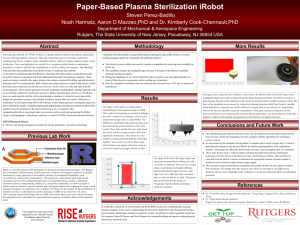Perez-Badillo, Steven: Paper-Based Plasma Sterilization iRobot
Title: Paper-Based Plasma Sterilization iRobot
Name: Steven Perez-Badillo
Home Institute: Rutgers, The State University of New Jersey
Programs: RISE program
Other contributors: Noah Harmatz and Aaron D Mazzeo
Abstract: Following the outbreak of COVID-19, there is a greater need for sterile work surfaces, particularly in areas with large numbers of people. Thus, the overarching goal is to develop a method for sanitizing large floors, counters, desks, and other surfaces, while not putting a human
worker at risk of infection. This issue highlights how crucial it is to integrate mobile robotics in sanitization procedures in order to facilitate the establishment of sterile working environments. The following work describes the modification of an iRobot Create 2’s hardware and software. At less than two hundred dollars the iRobot is a Roomba 600 series mobile vacuum that provides the perfect chassis to reprogram and attach underneath thin paper-based plasma sanitizers. These sanitizers feature a metallic-like paper structure that enhances material flexibility and aids electrical discharge used for creating plasma. Both volume and surface plasma is created in the process, which has been used to eliminate Saccharomyces cerevisiae, Escherichia coli cells, and other harmful microorganisms. These plasma generators are also completely biodegradable, and thus helps provide an eco-friendly solution for sterilization processes. Before attaching these sanitizers to the iRobot, however, analyzing the mobility of the robot through a simulator is critical for receiving prolific insight into parameter accuracy and collision avoidance among other key metrics. Moreover, a simulation was developed using MATLAB software, which helped generate a rectangular target area and a solid iRobot model. Carefully programmed path-planning and trajectory functions allowed the model to trace the perimeter of the area by following a set of waypoints. This computationally-driven experiment shows promising results toward reprogramming the iRobot Create 2 and equipping it with plasma sanitizers to combat COVID-19 and other harmful microbes.
Biography: Steven Perez-Badillo is a Hispanic first-generation student at Rutgers University in New Brunswick, New Jersey. At this prestigious University, he is a rising sophomore majoring in Mechanical Engineering. During his pre-college years, between 2015-2019, Steven received multiple Principal’s lists, Honor roll, and Exemplary student awards for his consistent academic achievement. In 2018, Steven was granted the “Seal of Biliteracy” from the state of New Jersey for his proficiency in English and Spanish. In 2019, Steven was awarded “Most Efficient AirEngine” for his senior project from the school’s engineering department for breaking the previously held machining record. Steven’s project achieved an outstanding low PSI of 2 and a high RPM of 2,931. In the same year, Steven received the “Margaret B. Beldon Endowed Scholarship,” the “Cooke Robert A Endowed Fund,” and a full-tuition grant from Rutgers Future Scholars. This year, GET UP allowed Steven to work under the tutelage of Professor Mazzeo in the Rutgers Lab for machines, manufacturing, and mechatronics. Steven will continue making great contributions in this lab during the rest of the summer and throughout the fall semester. Moving forward, after obtaining his bachelor’s, Steven will enroll in Rutgers’s 5-year master’s degree program and then continue his graduate studies toward a Ph.D.
